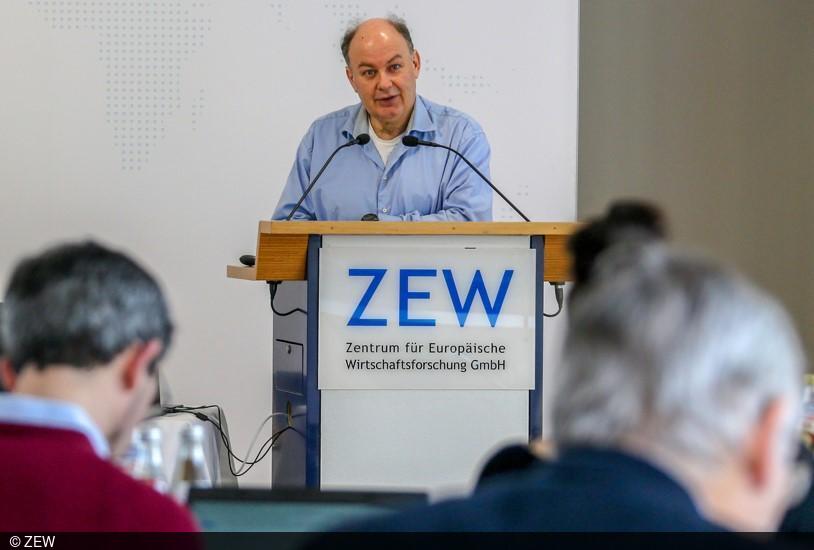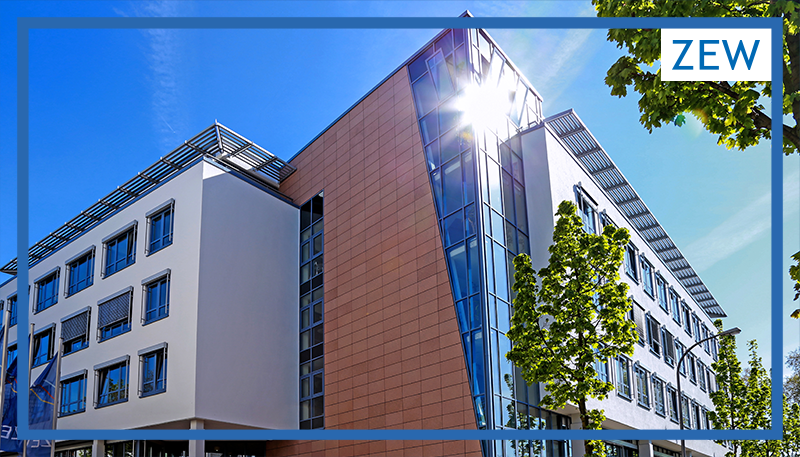FRAME Conference on the Role of Public Research in Innovation Hosted by ZEW
ConferencesTo what extent does innovation impact economic growth? Can public research foster innovation through the diffusion of knowledge? And how can policymakers encourage sustainable innovation and growth? These are some of the questions discussed by researchers and politicians from across Europe attending the FRAME Mid-Term Conference held at ZEW on 19–20 March 2018. The FRAME Project is sponsored by the European Commission within the framework of the research and innovation programme Horizon 2020, Grant No. 727073.
During the conference, participants discussed the latest research findings on the effects of public research funding on economic development from projects carried out as part of FRAME.These included projects involving macroeconomic modelling and underlying microeconomic evidence on the effects of research carried out at universities and research institutions on innovation activity. One focus of the conference was conveying these findings to agents based at government ministries and the central banks who may want to implement the presented modelling approaches in the future as a means of backing up their decisions.
Micro- and macroeconomic evidence in focus
Evidence – that is, tangible, comprehensible and unequivocal research results – at both the micro- and macroeconomic level was the focus of the studies presented at the conference. At the micro-level, the impact of publicly financed research and development (R&D) projects on innovation, growth and employment were discussed. Professor Jacques Mairesse from the United Nations University – Maastricht Economic and Social Research Institute on Innovation and Technology (UNU-Merit) identified positive effects of the R&D tax credit on R&D investment and productivity in French firms. ZEW economist and FRAME project member Dr. Maikel Pellens showed that joint research based on R&D contracts between private companies and Fraunhofer research institutes still exhibit positive employment effects even a number of years after the project in question has ended.
In terms of macroeconomic modelling of public R&D expenditure, both agent-based models and dynamic stochastic equilibrium models, known as DSGE models, were presented. For example, Dr. Tom Holden from the University of Surrey presented results from the partner project MONROE on the long-term growth effects of R&D using a multi-country DSGE model. Professor Giovanni Dosi and Professor Andrea Roventini, both from the Sant’Anna School of Advanced Studies in Pisa, highlighted the benefits of agent-based macroeconomic models for analysing the effects of technological advances. Bart Verspagen, director of UNU-Merit and professor at Maastricht University, looked at the impact of public research spending on productivity growth in OECD countries. His analysis was focused on public spending on mission-oriented projects in public R&D policy.
Lively panel discussion on current policy challenges
Following Bart Verspagen’s keynote, there was a panel discussion on current issues facing science, technology and innovation policy in Europe. The discussion was moderated by Dr. Georg Licht, head of the ZEW Research Department “Economics of Innovation and Industrial Dynamics”. Professor Peter McAdam, a principal economist at the European Central Bank, emphasised the complexity involved with designing new and efficient research and innovation policies and mapping them using economic macro models. According to McAdam, there are many possible approaches to explain the current global decline in productivity growth. Policymakers are faced with having to solve several different problems at once with a limited understanding of the extent of their impact and how they interact. Professor Diego Comin from the Centre for Economic Policy Research (CEPR) and currently at Dartmouth College agreed with this assessment, adding the insufficient diffusion of new technologies among businesses and between countries as a further explanatory factor. Dr. Alfred Gossner, former member of the executive board of the Fraunhofer Gesellschaft and president of the Munich Business School, emphasised the significance of promoting applied public research collaborations, citing as an example the role of the Fraunhofer research institutes in supporting firms in the adoption of new technologies in the area of sustainable energy production. Professor Andrea Roventini brought up the role of governments in encouraging economic recovery following a crisis. He called for more intensive use of mission-oriented approaches in public innovation policy. Dr. Werner Roeger, head of “Models and Databases” at the Directorate-General for Economic and Financial Affairs at the European Commission, mentioned the ongoing talks surrounding the future financial framework for R&D funding through the European Commission. He pointed out that, if the current rules for the revenue side of the EU budget remain unchanged, cuts to the Commission’s key programmes are inevitable. Therefore, improving the assessment of the macroeconomic effects of public R&D is a key mission. This is because, though there is the political will to introduce additional mission-oriented research programmes, budget cuts mean there is more limited scope for research and innovation policy.
About FRAME
FRAME receives funding from the European Union’s research and innovation programme Horizon 2020 under the terms of Grant Agreement No. (CO-CREATION-08-2016/2017: Better integration of evidence on the impact of research and innovation in policy making, Grant No. 727073). The project is coordinated by ZEW and run by a number of renowned international institutions, including Bocconi University in Milan, the London Business School, the Centre for Economic Policy Research in London, Pompeu Fabra University in Barcelona and Lund University. The project is also supported by the Fraunhofer Gesellschaft.

